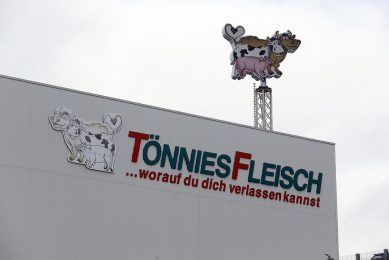Antibiotic confusion

There appears to be lightyears of interpretation differences between the supporters and critics of antibiotic reduction. Pig Progress editor Vincent ter Beek aims to identify where these differences of viewpoints come from.
A few weeks ago I attended the seminar ‘Solving the Antibiotics Puzzle’ by Biomin in Vienna, Austria. Interestingly, the company had gathered a group of experts, who, each from their own disciplines cast a view on how to produce pigs with fewer antibiotics.
It was a practical and insightful session, where experts on e.g. biosecurity, health management, vaccination and diet formulation all shared their views on how to do pig production with fewer antibiotics.
Why antibiotics need to come down
The next day, the event was rounded off by 2 of the company’s speakers, Franz Waxenecker and Nataliya Roth, emphasising once more the need why antibiotics in pig production need to be reduced.
They presented many reasons – for instance a study was shown in which the percentages of tetracycline-resistant E. coli isolated from swine were combined with antibiotic sales related to animal production, with Cyprus topping both lists. Another showed that antibiotic growth promoters are losing their effect. Numbers and figures from various countries across the globe were shown how antibiotics usage has influenced resistance issues – and also a recent report from the Netherlands was quoted, saying that antibiotic resistance is reversible.
Of course I saw the context. With its product range, a natural feed additives company like Biomin can play its part in reducing antimicrobial usage. I have to admit though, aiming for fewer antibiotics use all sounds pretty logical and convincing.
WHO publication on antibiotics
Yet, listening to all the studies presented, I kept thinking of a recent publication of the World Health Organization (WHO), calling for a reduction of antibiotics use in livestock. Or, to be more precise, the responses from the United States on these.
There was some strong resistance from across the Atlantic. The United States Department of Agriculture (USDA) released a statement stating that the WHO’s calls are ‘not supported by sound science’ and the National Pork Producers Council (NPPC) even went as far as to call the WHO statement ‘ill-advised’, ‘wrong’, ‘unethical’ and ‘immoral’.
How can it be, I wondered, that properly trained and well-educated, knowledgeable scientists on both sides of the Atlantic reach completely different insights and verdicts on this issue?
Different types of antibiotics usage
First – it helps to distinguish between types of antibiotics usage we are talking about. I’m quoting expert contributor David Burch in distinguishing up to 5 different ways to use antibiotics – each depending on location and situation.
• Growth promotion – low level continuous use; this may cross over into;
• Low level preventive use – usually on a long term basis;
• Prevention at a high level/ treatment level for a short period to eliminate an infection from carrier animals;
• Metaphylaxis (control) in the US where an infection is just starting so you treat the whole group, those with clinical signs and those without;
• Treatment, usually high levels and short to moderate period of time, up to 2 weeks according to the new legislation.
It’s clear that reducing antibiotics usage in one country or on one farm is not the same as reducing them in another. Depending on many factors, think of e.g. levels of biosecurity, legislation, farm size, professionalism of nutrition, to name a few, the way to interpret ‘reducing antibiotics’ is a different issue from place to place.
For a high health farm in Scandinavia it’s a different issue than on a larger backyard facility in a third world country. So in order to understand each other, it’s relevant to establish the individual situation of a farm or a country to identify potential next steps.
Antibiotic stewardship
USDA’s Dr Chavonda Jacobs-Young in her statement mainly points to the fact that the WHO guidelines are supported by ‘(very) low-quality evidence’, something that the WHO repeatedly indicated itself in its guidelines. Not denying the need for antibiotic stewardship, the agricultural department therefore predominantly asks for more data on antimicrobial use and resistance. Nothing wrong with that.
Animals likely getting a disease
Key in the NPPC press release, in my opinion, is the following sentence: “Prevention uses of antibiotics involve administering antimicrobial drugs to animals that aren’t exhibiting clinical signs of disease but that likely will get disease if a drug isn’t administered.”
A little later, the press release also stated: “Simply reducing on-farm uses of antibiotics, as the WHO suggests, however, likely would have no effect on public health and would jeopardise animal health.”
Now I am not an animal scientist, let alone a veterinarian. Nevertheless, just like many others, I’d like to find my own way in the dilemma.
I have read quite a few experts now stating that the (over)use of antibiotics in livestock production hardly has any effect on antibiotic effectiveness on human health. That if there has been any effect on human health, it is mostly caused by overuse in human medicine or use in pets. That is all fair enough, but even when human health is not jeopardised, but only has an effect on the way we can treat our farm animals, isn’t that alone a reason to reconsider our antibiotics usage?
Measures to keep me healthy
Next – personally I do not need antibiotics to keep me going. If it is cold, I wear an extra coat. I try to have diversified meals, drink healthy water, try to keep a little distance from people coughing a lot and try to do exercise from time to time. All these measures keep me healthy.
But, conversely, if we need antibiotics to keep livestock healthy – is that a sign that we care for the health and well-being of animals? Or is that a sign that perhaps it’s time to review the way the animals can be kept?

I just would like to quote the eminent vaccination expert Prof Paolo Martelli from Parma University, Italy, who spoke at the Biomin event. He said antibiotics cannot be eliminated because we need to be able to treat sick animals. Then he added: “Antibiotics cannot be an ‘umbrella’ protecting against lack of management, environment, biosecurity, welfare, etc.”
Wise words, if you ask me.












